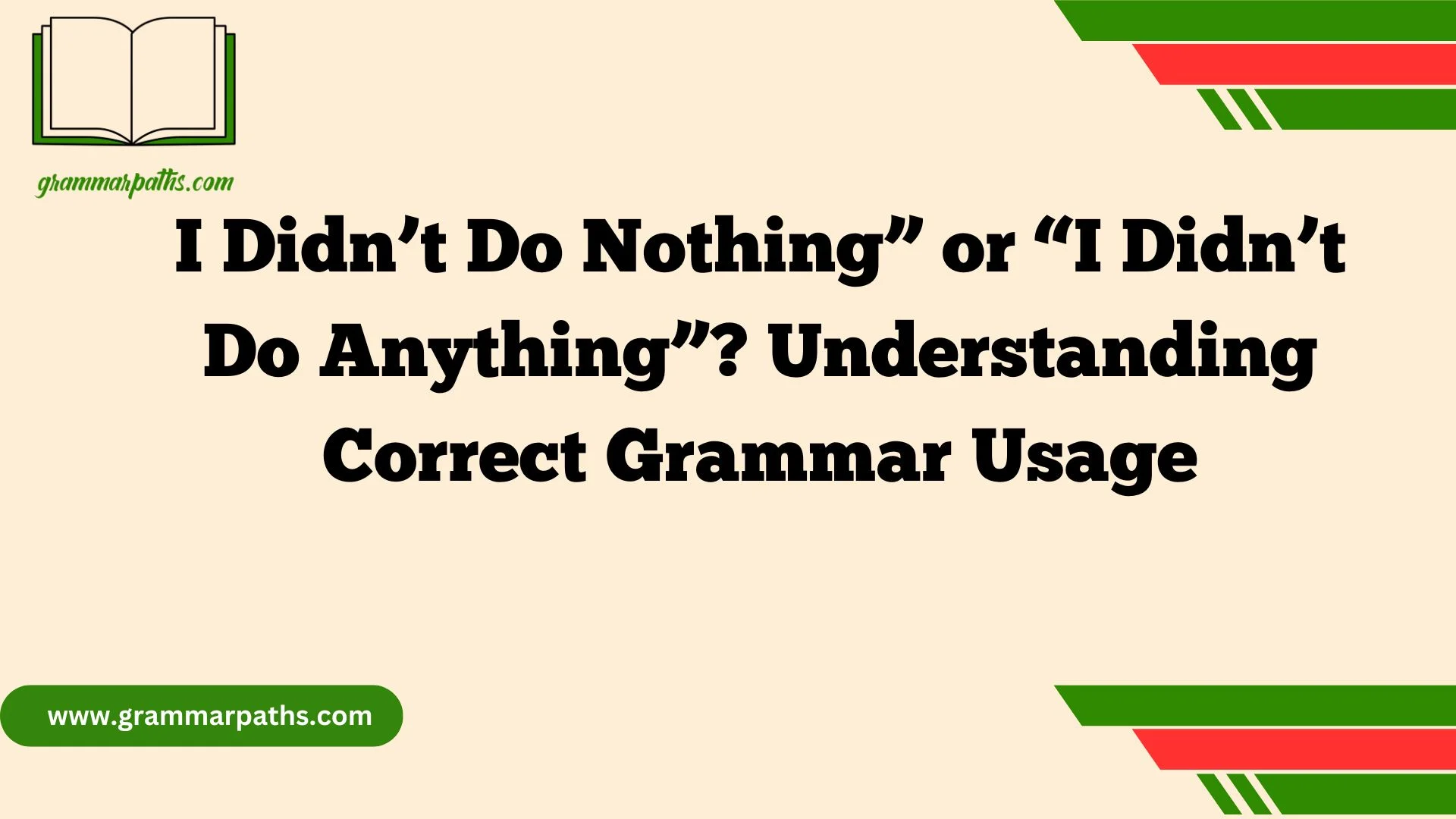When someone says, “I Didn’t Do Nothing,” it might sound familiar—but is it actually correct? This phrase is a prime example of a double negative, which can cause confusion even among native speakers. You’ll often hear it in informal speech, movies, music, or casual conversations. But when it comes to grammatical correctness, things get a little murky.
I Didn’t Do Nothing is used by many people to express innocence or denial, yet it raises a key question: Is it acceptable in standard English? Or is it just bad grammar that should be avoided?
In this guide, we’ll explore what I Didn’t Do Nothing really means, how it compares to “I didn’t do anything,” and when—if ever—it’s okay to use. We’ll break down the rules of English grammar, look at real-world examples, and uncover how cultural and regional differences play a role in this usage.
What Are Double Negatives?
Double negatives occur when two negative elements are used in the same sentence, typically leading to confusion or, in Standard English, an unintended affirmative meaning.
Examples of Double Negatives:
- “I can’t find no keys.”
- “She didn’t say nothing.”
- “They don’t want nobody here.”
Each of those sentences technically implies the opposite of what the speaker means—at least in formal grammar. But in informal or dialectal English, double negatives often serve as a form of emphasis, not contradiction.
Why “I Didn’t Do Nothing” Sounds Off
Let’s break this phrase down:
- “Didn’t” = did not (a negative)
- “Nothing” = another negative
Combining the two gives us a double negative, which in formal grammar rules, cancels each other out and creates a positive meaning.
So grammatically speaking, “I didn’t do nothing” literally means: “I did something.”
But most people saying it mean the opposite.
Here’s the breakdown in a table:
| Phrase | Literal Interpretation | Intended Meaning | Formality Level |
| I didn’t do nothing | I did something | I didn’t do anything | Informal/slang |
| I didn’t do anything | I did not do anything | I didn’t do anything | Formal/standard |
Why “I Didn’t Do Anything” Is Correct
Standard English follows the rule that only one negative is needed to express a negative idea. That’s why:
- “I didn’t do anything” = ✅ Correct
- “I didn’t do nothing” = ❌ Grammatically incorrect (in formal contexts)
More examples of correct usage:
- “She didn’t see anyone.”
- “They didn’t say anything.”
- “I didn’t hear anything unusual.”
These sentences are clear, grammatically correct, and universally accepted in academic, professional, and formal writing.
Dialects, Identity, and the Grammar Debate
Now, here’s where things get interesting.
Although “I didn’t do nothing” is considered incorrect in Standard English, it’s not wrong in every context.
Many dialects, especially in African American Vernacular English (AAVE), Southern American English, and Cockney English (UK), use double negatives intentionally for emphasis or rhythm.
Linguistic Fact:
In some languages like Spanish or Russian, double negatives are not only correct but expected.
For instance:
- Spanish: No vi nada (I didn’t see nothing) — perfectly correct in Spanish.
- Russian: Ya nikogo ne videl (I didn’t see nobody) — again, totally acceptable.
In English dialects, similar constructions aren’t a sign of laziness or ignorance—they reflect historical evolution and cultural expression.
Famous Example:
“I ain’t got no money.”
While technically a double negative, it conveys a stronger emotional tone than the standard: “I don’t have any money.”
Real-World Usage in Pop Culture
Let’s take a look at how double negatives show up in music, film, and literature.
| Source | Quote | Explanation |
| The Rolling Stones | “I can’t get no satisfaction” | Used for lyrical rhythm and impact |
| Jay-Z (Rapper) | “I ain’t never scared” | Emphasizes fearlessness |
| Street Dialogue (TV) | “I didn’t do nothing!” | Reflects spoken dialect |
These phrases wouldn’t fly in a grammar exam, but in storytelling, art, or real-life dialogue, they carry tone, mood, and identity.
Common Confusions: “Nothing” vs. “Anything”
Let’s look at why these words trip people up.
Definitions:
- Anything: Used in negative, interrogative, and conditional sentences
- Nothing: Used in affirmative sentences for negative meaning
Usage Table:
| Situation | Correct Sentence | Explanation |
| Negative statement | I didn’t say anything. | Standard usage with “didn’t” |
| Affirmative + negative word | I said nothing. | Affirmative verb + negative noun |
| Incorrect double negative | I didn’t say nothing. | Incorrect in formal grammar |
How to Avoid Double Negatives in Writing
If you’re writing for school, business, or any formal audience, it’s best to avoid double negatives entirely.
Here’s how to fix them:
| Double Negative Sentence | Corrected Version |
| I don’t want nothing. | I don’t want anything. |
| She didn’t tell nobody. | She didn’t tell anybody. |
| We can’t do nothing. | We can’t do anything. |
Quick Grammar Tips:
- Use “anything, anybody, ever, anywhere” with negative verbs
- Reserve “nothing, nobody, never, nowhere” for affirmative sentences
- Read sentences aloud to catch awkward phrasing
- Use grammar tools like Grammarly, Hemingway App, or ProWritingAid
Mini Grammar Quiz: Can You Spot the Errors?
Test your instincts with this quick challenge. Scroll down for the answers.
Identify whether the sentence is correct or incorrect:
- I didn’t do nothing.
- I don’t want anything.
- She didn’t call nobody.
- He hasn’t told anyone yet.
- We didn’t go nowhere yesterday.
Quiz Answers & Explanations:
| Sentence | Correct/Incorrect | Why |
| I didn’t do nothing. | ❌ Incorrect | Double negative |
| I don’t want anything. | ✅ Correct | Proper use of negative + word |
| She didn’t call nobody. | ❌ Incorrect | Double negative |
| He hasn’t told anyone yet. | ✅ Correct | Standard grammar |
| We didn’t go nowhere yesterday. | ❌ Incorrect | Double negative |
Case Study: Double Negatives in Different Contexts
Let’s examine how “I didn’t do nothing” is perceived in two environments.
Case Study 1: High School Student (Formal Essay)
A student writes:
“I didn’t do nothing wrong.”
Feedback: Teacher marks it incorrect, advises:
Use ‘I didn’t do anything wrong’ for clarity and correctness.
Reason: Academic writing requires standard grammar to meet grading rubrics.
Case Study 2: Character Dialogue in a Screenplay
A character yells:
“I didn’t do nothing, man! I swear!”
Feedback: Director keeps it—adds realism and emotion.
Reason: Reflects real-world speech, adds authenticity to the character’s background and environment.
FAQs: Your Grammar Questions Answered
Is it correct to say “didn’t do nothing”?
Technically, “didn’t do nothing” is a double negative and is considered incorrect in standard English. However, it’s common in informal speech to emphasize innocence.
Is “I didn’t do nothing” a double negative?
Yes, “I didn’t do nothing” contains two negatives—“didn’t” and “nothing”—which cancel each other out. In formal grammar, this implies the opposite: that you did something.
Is “I did nothing” correct grammar?
Absolutely. “I did nothing” is a grammatically correct and clear sentence that properly expresses doing no action or being innocent.
Is it correct to say “I can’t do nothing”?
No, it’s not correct in formal English—it’s another double negative. The proper version is “I can’t do anything.”
How to say no I can’t do that?
You can say, “No, I can’t do that” or “Sorry, I’m not able to do that.” These are both polite and clear refusals.
Final Thoughts: Know the Rules—Then Use Them Wisely
In the end, phrases like “I didn’t do nothing” may be common in informal speech, but they’re considered grammatically incorrect due to their use of double negatives. While this structure might be used for emphasis in casual conversations, songs, or regional dialects, it doesn’t follow the rules of standard English.
For clarity and correctness—especially in writing or formal situations—use phrases like “I didn’t do anything” or “I did nothing.” These are not only grammatically sound but also leave no room for confusion.
So, the next time you hear someone say, “I didn’t do nothing,” you’ll know exactly what’s happening grammatically—and how to say it better. Understanding these nuances strengthens your communication skills and ensures your message is both accurate and professional.

Emma Brooke is a passionate language expert and contributor at GrammarPaths.com, where she helps learners navigate the complexities of English grammar, idioms, and effective writing. With a strong academic background and years of teaching experience, Emma excels at turning tricky grammar rules into simple, practical lessons that readers can easily grasp.












